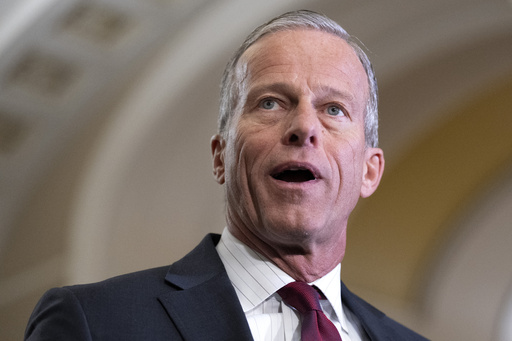WASHINGTON — Senate Republicans recently initiated discussions surrounding a substantial $340 billion budget bill aimed at supporting the administration’s extensive deportation and border security initiatives. This legislative effort quickly encountered disruption as President Donald Trump publicly criticized the approach advocated by Senate Budget Committee Chairman Lindsey Graham of South Carolina. Instead, Trump voiced his support for the House Republicans’ more ambitious proposal, which encompasses $4.5 trillion in tax reductions along with a variety of other priorities. Senators had planned to tackle those issues in a subsequent package.
Meanwhile, Vice President JD Vance was on route to Capitol Hill to engage in private discussions with Republican senators. Trump took to social media to express his disapproval, stating, “Unlike the Lindsey Graham version of the very important Legislation currently being discussed, the House Resolution implements my FULL America First Agenda, EVERYTHING, not just parts of it!” He is advocating for the passage of the House’s proposal as a mechanism to jumpstart negotiations, aiming for a comprehensive “ONE BIG BEAUTIFUL BILL.”
The reaction from Senate Republican leaders was one of surprise and concern, caught off guard by Trump’s statements. “As they say, I did not see that one coming,” remarked Senate Majority Leader John Thune from South Dakota. Thune had orchestrated the two-bill strategy to provide an early legislative win for the White House and had been advancing the Senate’s efforts while the House was in recess. He stated that they were still planning to move forward but were eager to gain further insights into the White House’s position.
This unexpected development adds to the ongoing challenges in the budgetary process. Although Republicans hold the majority in both the House and Senate, they are facing significant obstacles in attempting to translate the president’s ambitions into law, especially as Democrats prepare to counter the multiple initiatives from the administration. Earlier in the week, Republicans had managed to push through a limited budget bill with a party-line vote of 50-47, marking what they hoped would be the first move in fulfilling Trump’s commitments related to tax cuts, energy policies, and border enforcement.
Additionally, the administration’s focus on government efficiency has resulted in cutbacks across various departments, leading to job losses for federal employees and the dismantling of numerous essential programs. In response, Democrats, who initially struggled to adapt to the rapid changes from the administration, have united in efforts to alert the public about the implications of these actions. Senate Democratic Leader Chuck Schumer from New York denounced the Republican bills, claiming they are merely intended to provide tax breaks for the wealthy at the expense of crucial services for average Americans.
Schumer held a private conference with fellow Democratic senators over the weekend, where they formulated a strategy to challenge the Republicans for favoring tax reductions that predominantly benefit wealthy individuals while undermining essential services in healthcare and other areas. He warned, “This is going to be a long, drawn-out fight.” The Senate’s budget proceedings commenced this week, featuring an initial 50 hours of debate followed by what is anticipated to be an all-night session filled with numerous attempts to amend the proposed package.
The Republican budget plan allocates approximately $175 billion for border security, which includes funding for deportation efforts and the construction of the U.S.-Mexico border wall, alongside a proposed $150 billion increase for the Pentagon and $20 billion for the Coast Guard. Determined to advance their agenda, Republicans have responded to warnings from Trump’s border aids, Tom Homan and Stephen Miller, regarding financial shortages necessary to achieve the president’s immigration objectives. Trump previously engaged with Republican senators and emphasized the need for results without a preference for either one or two bills.
The Senate Budget Committee indicated that its proposal would incur approximately $85.5 billion annually during the four years of Trump’s presidency, suggesting that funding would be sourced from cuts and revenues generated elsewhere. In an effort to identify ways to finance it, Republican senators are contemplating the reversal of the Biden administration’s methane emissions fee that was enacted as part of climate initiatives in the Inflation Reduction Act, alongside potential new revenue from energy leases.
The House GOP’s forthcoming bill is substantially larger, proposing $4.5 trillion in tax cuts and $1.5 trillion in spending reductions over a decade affecting Medicaid, food assistance, and other vital services. These cuts may reach up to $2 trillion to satisfy the demands of hardline conservatives. Both budget proposals are under consideration through a process known as reconciliation, which facilitates passage through a simple majority, bypassing some of the traditional legislative hurdles. Historically less common, reconciliation has seen increased utilization in Congress for impactful legislation when one party commands both the White House and legislative chambers. In Trump’s initial term, Republicans leveraged reconciliation to implement tax cuts in 2017, while Democrats employed it during Biden’s administration to pass COVID relief measures and the Inflation Reduction Act.




